Best Threat Hunting Certifications To Boost Your Hunting Skills in 2026
Published on Oct 23, 2025

Looking to get threat hunting certifications to advance your cybersecurity career? You're on the right path, as the demand for skilled cybersecurity professionals keeps growing. According to the U.S. Bureau of Labor Statistics, employment of information security analysts is projected to grow 29% from 2024 to 2034, way faster than the average for all occupations.
At the same time, organizations are recognizing the value of proactive defense: a survey by Intrusion found that 50% of companies say threat hunting provides a deeper understanding of adversary behavior and trends.
At Hunt.io, we've worked with many certified hunters and seen how the right training directly impacts real-world results. Several of our team members hold advanced certifications in threat hunting and digital forensics, which shape how we approach investigations every day. Whether running complex HuntSQL queries, tracing attacker infrastructure with AttackCapture, or mapping live C2 networks, the mix of formal training and hands-on experience makes all the difference.
With demand rising for proactive security professionals, certifications are more valuable than ever. This article breaks down the top options, what they offer, and how to find the one that fits your goals.
Why Threat Hunting Certifications Matter
Threat hunting is essential to identify and mitigate advanced cybersecurity threats that traditional defenses may miss on the defensive side. Okta states that "threat hunters actively seek out and eliminate threats before they cause damage."
Organizations benefit a lot from having threat hunters who can proactively look for vulnerabilities and mitigate potential threats before they happen. This proactive approach improves overall security and prevents external attackers from exploiting vulnerabilities. A comprehensive threat hunt can further bolster these efforts.
Getting a threat hunting certification gives professionals skills that go beyond basic IT knowledge. Certified individuals can find hidden threats within an organization to improve the overall security. Threat hunters use modern techniques to stay ahead of potential cyber threats, so the role of a threat hunter is essential in large enterprises where security is a top priority.
Threat hunting certifications provide a structured learning path for professionals to develop and refine their skills. These certifications cover various threat hunting methodologies, threat hunting tools, and techniques, so threat hunters are equipped to identify and neutralize threats.
Staying up to date with the latest threat hunting concepts is a must, and certifications are the best way to do that.
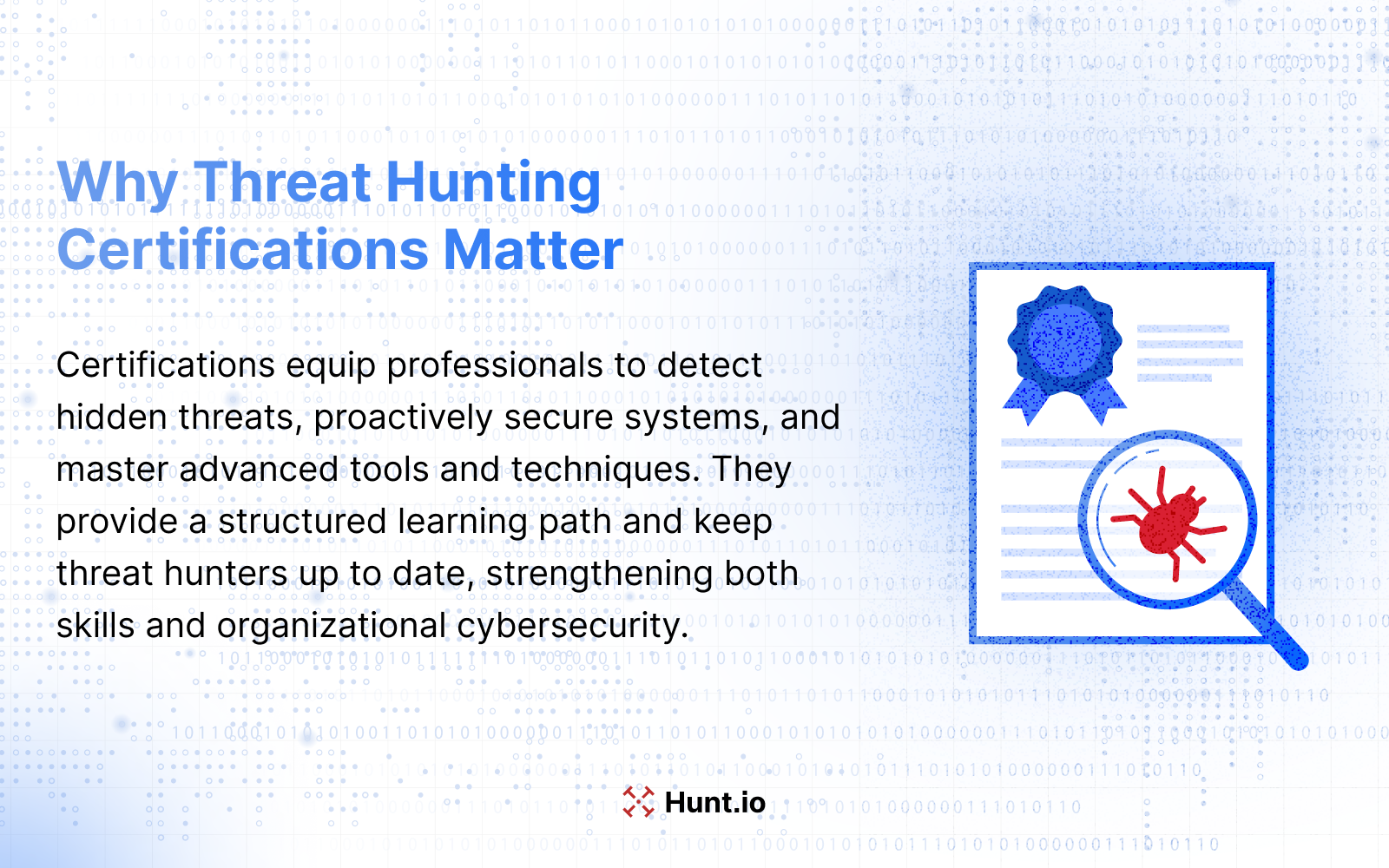
Top 7 Threat Hunting Certifications in 2026
In 2026, several threat hunting certifications stand out for their comprehensive coverage of the skills and knowledge required in the cybersecurity field. Each certification has its unique features and benefits that cater to the needs of cybersecurity professionals at different career stages.
Whether you're a newbie building a foundation or an experienced professional looking for advanced training, there's a certification for you. Let's dive into the top threat hunting certifications for this year
OffSec TH-200: Foundational Skills for New Threat Hunters
The OffSec TH-200 certification provides foundational skills for effective threat hunting. Students learn:
To identify indicators of compromise.
To understand network traffic, essential for detecting cyber threats.
About common adversarial tactics and techniques.
Systematic methodologies for threat hunts.
Hands-on practice is a core component of the OffSec TH-200 certification. Students will:
Use threat hunting frameworks for investigating and analyzing threats.
Apply theoretical knowledge in real-world scenarios.
Practice exercises that simulate real threat environments.
These activities will prepare students to handle real threat hunting situations and ensure new hunters can contribute to their organization's security operations from day one, using proactive strategies while proactively searching within the compromised system.
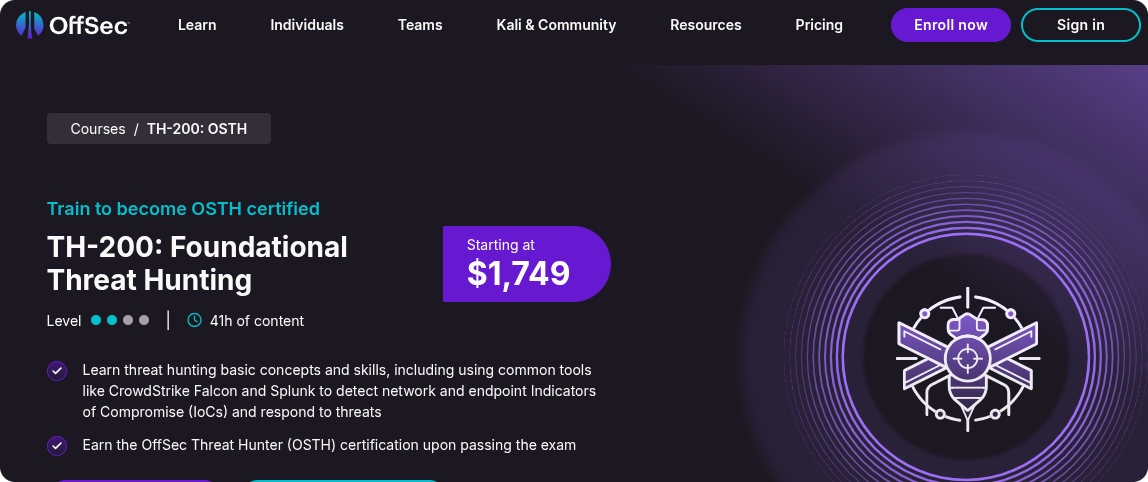
Intel-Ops Hunting Adversary Infrastructure
Intel-Ops' Hunting Adversary Infrastructure course offers an in-depth exploration into tracking and analyzing threat actor infrastructure. Designed for both beginners and seasoned professionals, it emphasizes practical methodologies and real-world applications.
Key modules include advanced pivoting techniques, tracking APT and ransomware group infrastructures, and identifying post-exploitation tools like Cobalt Strike and Sliver. The course integrates frameworks such as MITRE ATT&CK and the Diamond Model to enhance threat analysis.
Additionally, it covers automation, scripting, and API utilization to streamline research processes. With lifetime access and continuous updates, this training ensures that cybersecurity professionals remain adept at countering evolving threats.
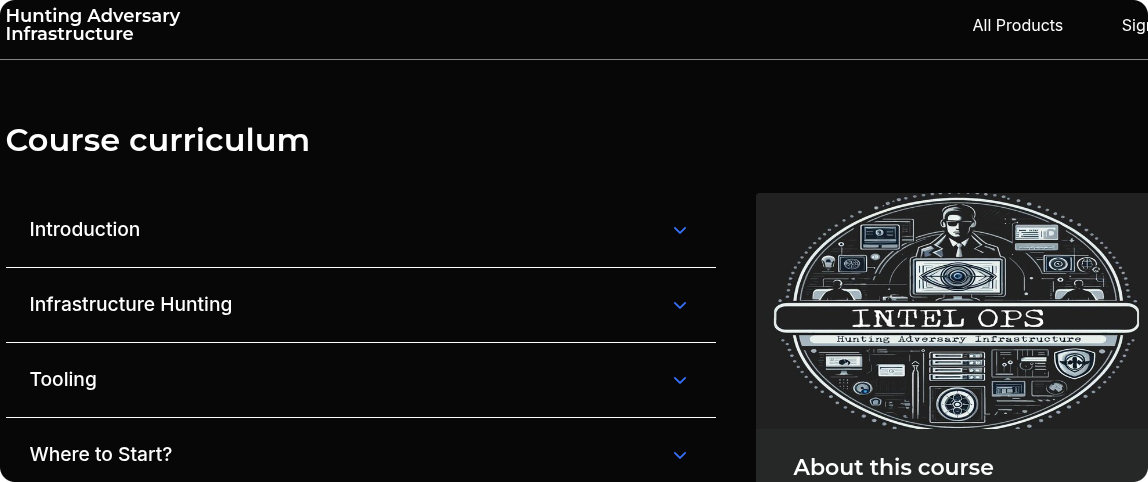
SANS FOR508: Advanced Incident Response and Threat Hunting
The SANS FOR508 certification is known for its focus on advanced threat hunting techniques for detecting and responding to advanced threats. This course is for security professionals involved in incident response and threat hunting, it gives them the skills to identify and neutralize advanced persistent threats..
The SANS FOR508 course includes extensive practical exercises and a team-based incident response challenge. These activities will help students develop a deep understanding of threat hunting concepts and improve their ability to detect and respond to malicious activities.
By the end of the course, students will be able to proactively search for and mitigate threats, significantly contributing to their organization's security.
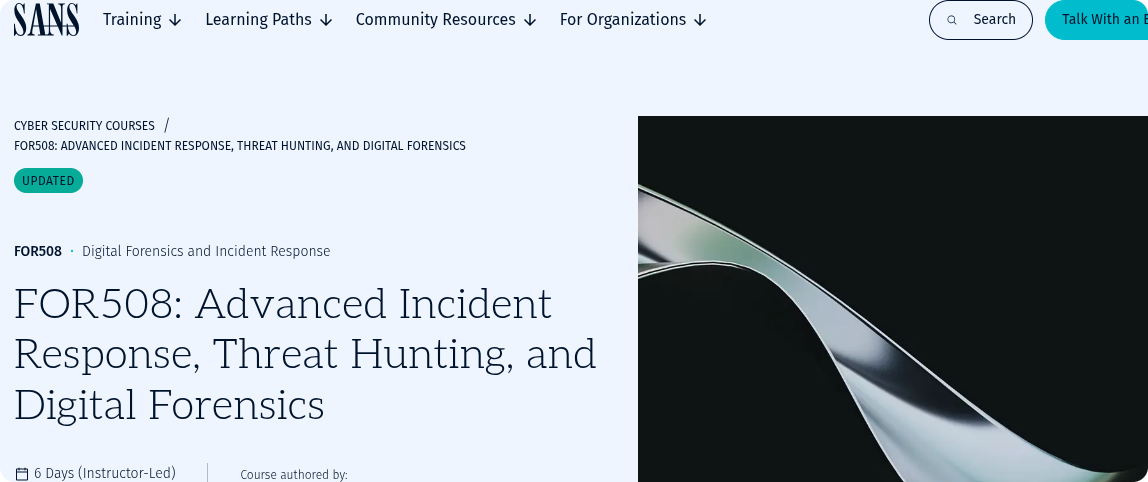
Infosec Institute Cyber Threat Hunting Certification Training Boot Camp
Infosec Institute's Cyber Threat Hunting Boot Camp is focused on practical threat hunting skills, career advancement, and certification preparation. This intensive training is for professionals in various roles who are interested in threat hunting.
The boot camp covers a wide range of topics, including network security, digital forensics, and threat intelligence, so students get a comprehensive understanding of the threat hunting process.
One of the unique features of Infosec's Boot Camp is its guarantee to pay for a second exam attempt if students don't pass the CCTHP exam on their first try. This shows Infosec's commitment to ensuring students are well prepared and confident in their skills.
The hands-on, instructor-led training approach ensures students get practical experience in a controlled environment, preparing them for real-world challenges.
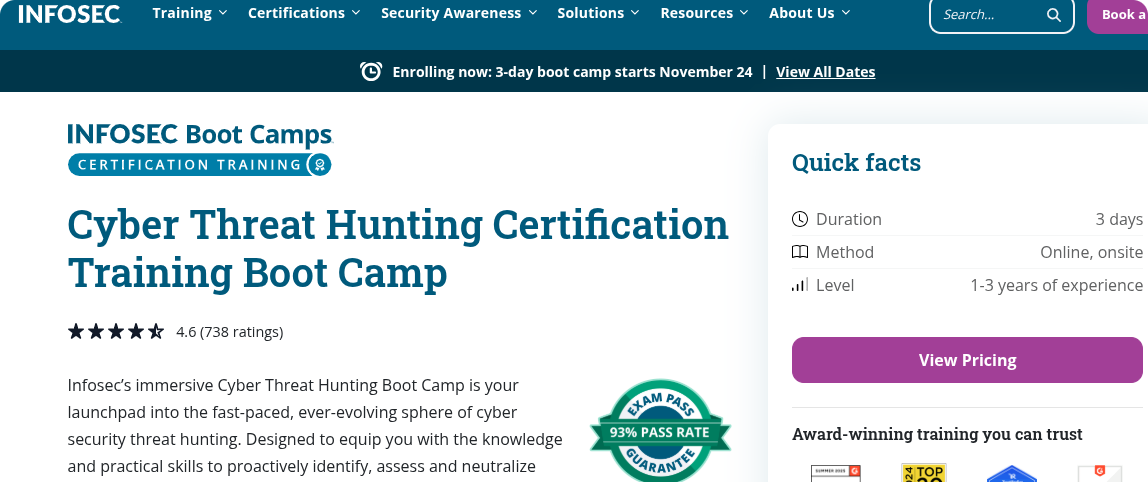
Coursera Cyber Threat Hunting Specialization
Coursera's Cyber Threat Hunting course, created in partnership with Infosec, breaks down the discipline into nine modular lessons that students can complete at their own pace. Designed for intermediate learners, the course expects some basic Linux and IT experience, and is a great starting spot for future threat hunters.
Students will develop skills in areas like threat intelligence, network and endpoint analysis, anomaly detection, SIEM, and the MITRE ATT&CK framework. Through hands-on labs and real-world scenarios, the course guides students from hypothesis development to execution of hunts and remediation.
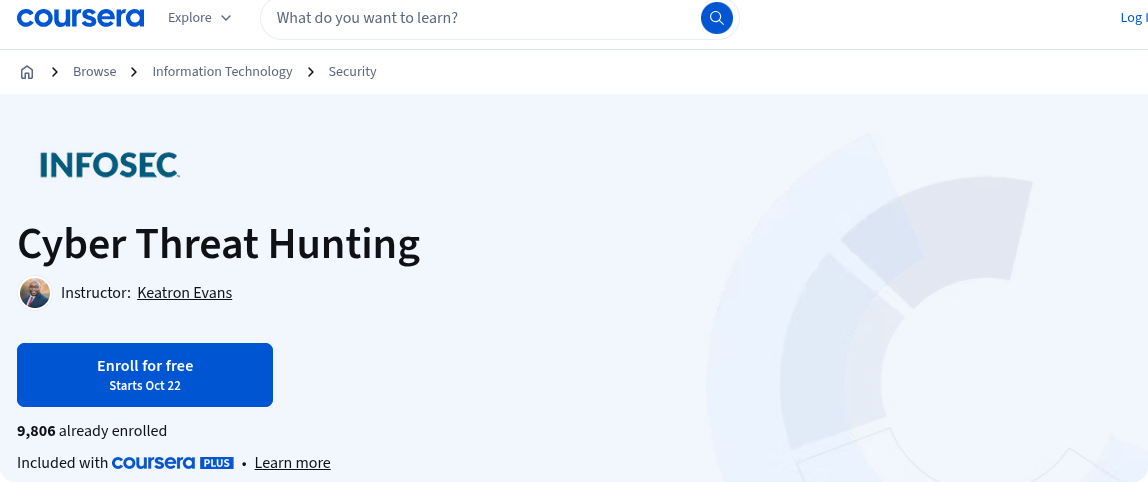
EC-Council Certified Threat Intelligence Analyst (CTIA)
EC-Council's CTIA (Certified Threat Intelligence Analyst) is a specialist-level certification built to train professionals in the full threat intelligence life cycle, from planning and direction through collection, analysis, production, and dissemination.
The program emphasizes both theory and hands-on skills: about 40% of training is lab-based, involving real-world scenarios. It covers multiple intelligence levels (strategic, operational, tactical, technical) and teaches how to integrate threat intelligence into SOC operations, incident response, risk management, and even automated threat hunting via Python scripting.
On completion, CTIA holders are better positioned for roles like threat intelligence analyst, threat hunter, or SOC intelligence lead.
.png)
Mandiant Practical Threat Hunting Certification
Mandiant's Practical Threat Hunting course (offered through Google Cloud) is a hands-on, instructor-led program designed to teach threat hunters and incident responders how to develop and execute threat hunts in real-world environments.
Over the course of 3 days (in-person) or 4 days (virtual), participants learn to frame hunt hypotheses, apply threat intelligence to uncover adversary activity, and leverage endpoint and network data to hunt for signs of compromise.
The curriculum introduces the A4 framework, emphasizes a repeatable methodology, and challenges students with lab scenarios using tools like the command line, Jupyter Notebook, and Velociraptor.
Ideal for security analysts, SOC practitioners, and incident responders, the course bridges theory and practice in modern threat hunting.
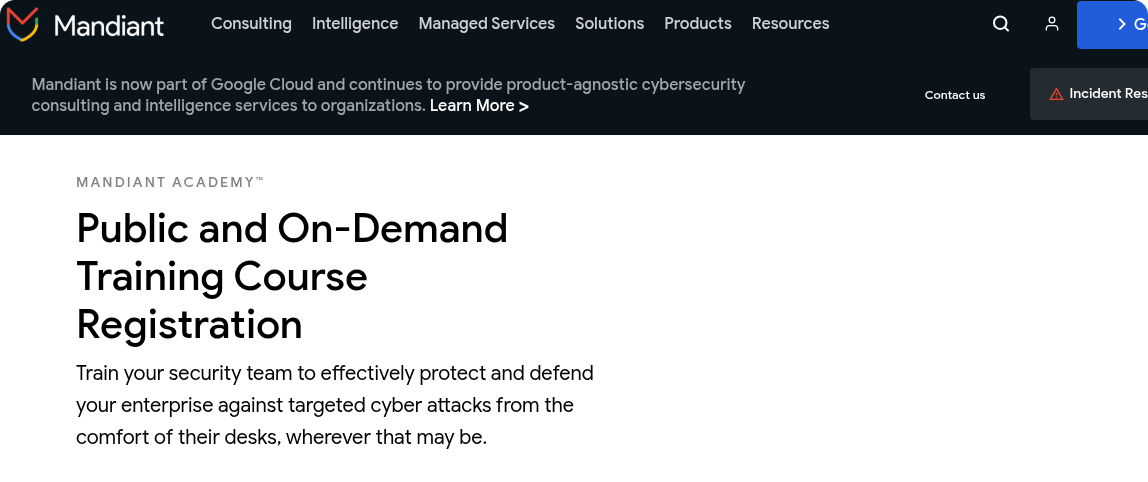
Choosing the Right Threat Hunting Certification
Choosing the right threat hunting certification depends on your career aspirations, learning style, and resources. With many certifications available, it's important to choose one that aligns with current knowledge, threat hunting maturity, and future career goals.
The following sections will help you assess your experience level, evaluate learning formats, and consider the value of different certifications.
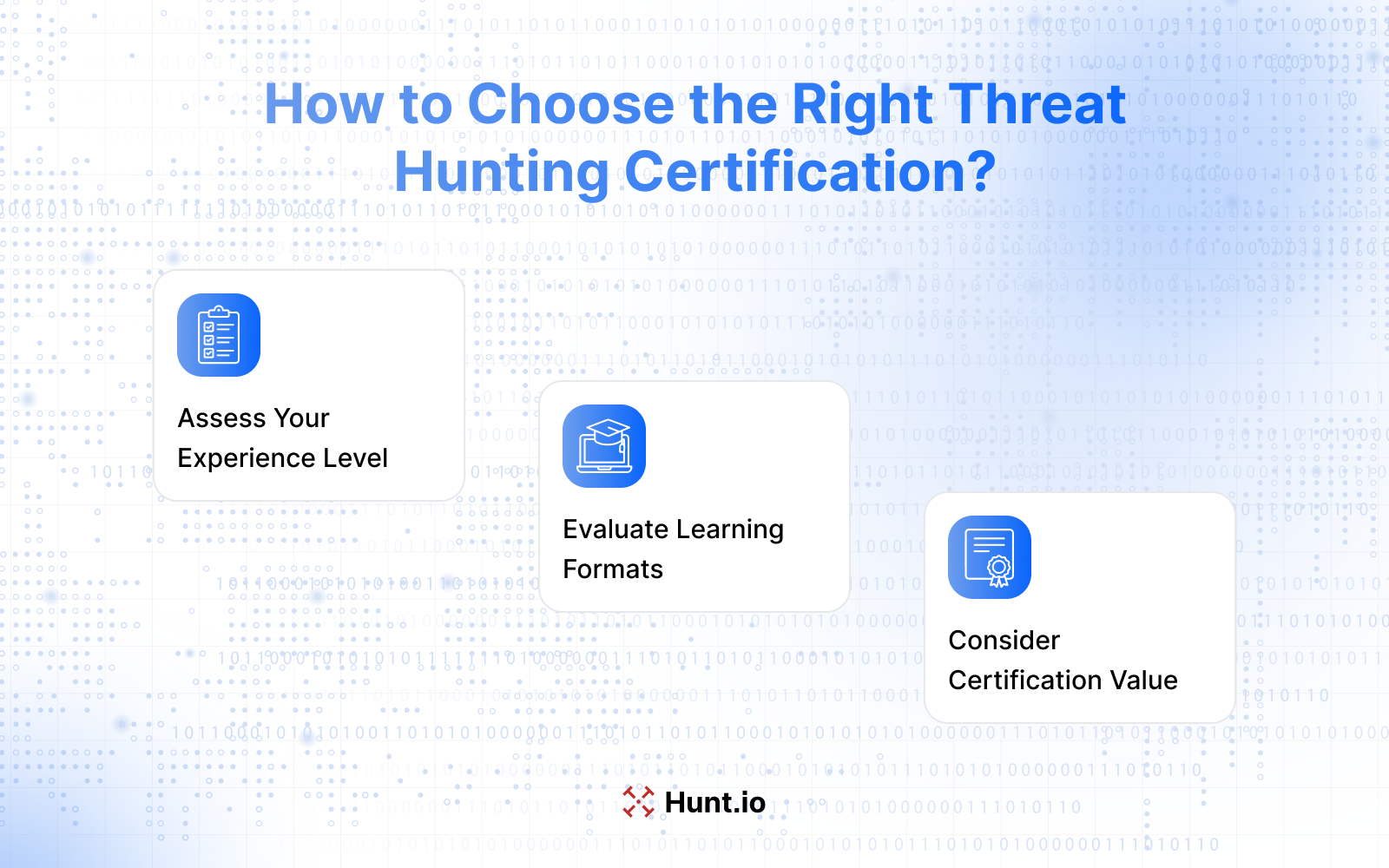
Assess Your Experience Level
Assessing your experience level is key to choosing the right certification that matches your knowledge and career goals. For beginners, the OffSec TH-200 certification provides:
Foundational skills and methodologies. Great starting point.
Hands-on practice and tool usage.
Practical skills to identify and mitigate threats.
Meanwhile, the Elastic Private Threat Hunting with Kibana course provides comprehensive training. Designed for those with more experience and using the Elastic Stack.
Choosing the right certification enhances your skills and aligns them with your career goals. So you are ready to tackle real-world scenarios and advance in your cybersecurity career.
Evaluate Learning Formats
Evaluating learning formats is important to choose a certification program that fits your schedule and learning style. Instructor-led training offers structured learning with immediate feedback from instructors, which can help with understanding and retention of complex material. This is ideal for those who benefit from direct interaction and guidance.
Self-paced learning allows individuals to learn at their own pace, which is suitable for those with varying schedules or study preferences. Hybrid formats combine elements of in-person and online learning, offering flexibility and a comprehensive approach to skill development.
Evaluating these formats will help you choose a certification program that suits you.
Consider Certification Value
The value of a certification can vary greatly based on industry recognition and relevance to job roles. Certifications from well-known organizations like SANS and EC-Council generally have more value in the job market and career prospects, and job opportunities.
Consider the prestige and recognition of a certification when making your choice. Not all certifications have the same recognition or value, so it's important to choose one that aligns with your career goals and industry standards.
By choosing a well-known certification, you can improve your job prospects and have your skills recognized and valued in the cybersecurity industry.
Selecting the right certification is more than just completing a course; it's about strategically positioning yourself in the cybersecurity landscape. With the proper credentials in hand, you open doors to specialized roles and exciting career opportunities in threat hunting.
Career Opportunities for Certified Threat Hunters
Certified threat hunters have many career opportunities. Job titles for certified threat hunters include Cyber Hunting Analyst, Cyber Threat Hunter, and Threat Hunting Analyst.
These roles involve detecting advanced threats that evade standard automated security controls, analyzing security data to identify trends, and predicting potential future attacks.
Getting threat hunting certifications can lead to career advancement and higher salaries. Beyond that, certifications provide tangible benefits that enhance a threat hunter's ability to protect organizations.
Benefits of Being a Certified Threat Hunter

Getting a threat hunting certification validates a professional's ability to perform as a threat hunter and improves their career prospects. Certifications focus on hands-on practice with relevant tools and reinforce theoretical knowledge, and prepare candidates for real-world applications. For example, the Infosec boot camp prepares participants not only for certification but for practical application in real-world scenarios.
As the demand for skilled cybersecurity professionals continues to grow, getting a threat hunting certification can improve job prospects.
Overall, these certifications validate skills, improve career prospects, and meet the growing market demand for specialized cybersecurity professionals. Certified threat hunters are essential to any security team.
Understanding the advantages of certification is one thing, but achieving it requires preparation. From hands-on practice to mastering theoretical concepts, a structured study approach ensures you are ready to excel in the certification exam and apply your skills confidently.
Preparing for Your Threat Hunting Certification Exam
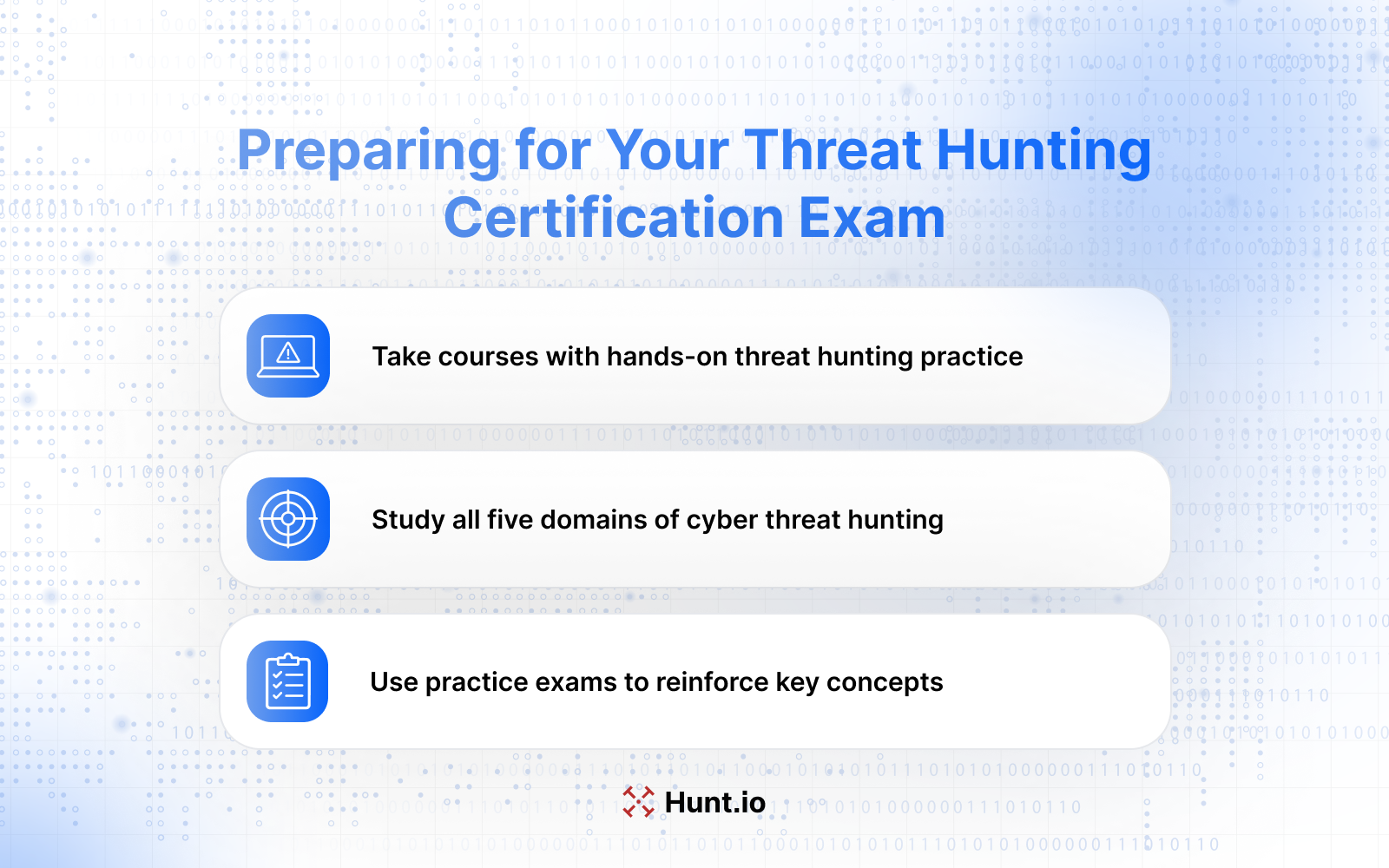
Preparing for a threat hunting certification exam requires a strategic approach. Key preparation strategies include:
Taking courses that include practical applications of threat hunting, focusing on current techniques and tools.
Studying the five domains of cyber threat hunting to being well prepared for the exam.
Using practice exams to significantly enhance retention and understanding of key concepts.
Hands-on practice is key for certification exams. For example, the OffSec TH-200 certification has substantial hands-on practice with threat hunting tools and log analysis. The SANS FOR508 course has extensive hands-on exercises and a team-based incident response challenge.
Focusing on practical skills ensures candidates are well prepared for the certification exam and can apply their knowledge in real-world scenarios.
Summary
Threat hunting certifications are a must-have for any cybersecurity professional looking to upskill and advance their career. The certifications mentioned in this guide offer options for both beginners and experienced professionals.
At Hunt.io, we help security teams stay ahead of attackers by giving them the right tools, data, and training to uncover and stop hidden threats before they cause damage. Want to see how our platform can level up your threat hunting efforts? Book a demo now and discover how we can strengthen your organization's defenses.
Looking to get threat hunting certifications to advance your cybersecurity career? You're on the right path, as the demand for skilled cybersecurity professionals keeps growing. According to the U.S. Bureau of Labor Statistics, employment of information security analysts is projected to grow 29% from 2024 to 2034, way faster than the average for all occupations.
At the same time, organizations are recognizing the value of proactive defense: a survey by Intrusion found that 50% of companies say threat hunting provides a deeper understanding of adversary behavior and trends.
At Hunt.io, we've worked with many certified hunters and seen how the right training directly impacts real-world results. Several of our team members hold advanced certifications in threat hunting and digital forensics, which shape how we approach investigations every day. Whether running complex HuntSQL queries, tracing attacker infrastructure with AttackCapture, or mapping live C2 networks, the mix of formal training and hands-on experience makes all the difference.
With demand rising for proactive security professionals, certifications are more valuable than ever. This article breaks down the top options, what they offer, and how to find the one that fits your goals.
Why Threat Hunting Certifications Matter
Threat hunting is essential to identify and mitigate advanced cybersecurity threats that traditional defenses may miss on the defensive side. Okta states that "threat hunters actively seek out and eliminate threats before they cause damage."
Organizations benefit a lot from having threat hunters who can proactively look for vulnerabilities and mitigate potential threats before they happen. This proactive approach improves overall security and prevents external attackers from exploiting vulnerabilities. A comprehensive threat hunt can further bolster these efforts.
Getting a threat hunting certification gives professionals skills that go beyond basic IT knowledge. Certified individuals can find hidden threats within an organization to improve the overall security. Threat hunters use modern techniques to stay ahead of potential cyber threats, so the role of a threat hunter is essential in large enterprises where security is a top priority.
Threat hunting certifications provide a structured learning path for professionals to develop and refine their skills. These certifications cover various threat hunting methodologies, threat hunting tools, and techniques, so threat hunters are equipped to identify and neutralize threats.
Staying up to date with the latest threat hunting concepts is a must, and certifications are the best way to do that.

Top 7 Threat Hunting Certifications in 2026
In 2026, several threat hunting certifications stand out for their comprehensive coverage of the skills and knowledge required in the cybersecurity field. Each certification has its unique features and benefits that cater to the needs of cybersecurity professionals at different career stages.
Whether you're a newbie building a foundation or an experienced professional looking for advanced training, there's a certification for you. Let's dive into the top threat hunting certifications for this year
OffSec TH-200: Foundational Skills for New Threat Hunters
The OffSec TH-200 certification provides foundational skills for effective threat hunting. Students learn:
To identify indicators of compromise.
To understand network traffic, essential for detecting cyber threats.
About common adversarial tactics and techniques.
Systematic methodologies for threat hunts.
Hands-on practice is a core component of the OffSec TH-200 certification. Students will:
Use threat hunting frameworks for investigating and analyzing threats.
Apply theoretical knowledge in real-world scenarios.
Practice exercises that simulate real threat environments.
These activities will prepare students to handle real threat hunting situations and ensure new hunters can contribute to their organization's security operations from day one, using proactive strategies while proactively searching within the compromised system.

Intel-Ops Hunting Adversary Infrastructure
Intel-Ops' Hunting Adversary Infrastructure course offers an in-depth exploration into tracking and analyzing threat actor infrastructure. Designed for both beginners and seasoned professionals, it emphasizes practical methodologies and real-world applications.
Key modules include advanced pivoting techniques, tracking APT and ransomware group infrastructures, and identifying post-exploitation tools like Cobalt Strike and Sliver. The course integrates frameworks such as MITRE ATT&CK and the Diamond Model to enhance threat analysis.
Additionally, it covers automation, scripting, and API utilization to streamline research processes. With lifetime access and continuous updates, this training ensures that cybersecurity professionals remain adept at countering evolving threats.

SANS FOR508: Advanced Incident Response and Threat Hunting
The SANS FOR508 certification is known for its focus on advanced threat hunting techniques for detecting and responding to advanced threats. This course is for security professionals involved in incident response and threat hunting, it gives them the skills to identify and neutralize advanced persistent threats..
The SANS FOR508 course includes extensive practical exercises and a team-based incident response challenge. These activities will help students develop a deep understanding of threat hunting concepts and improve their ability to detect and respond to malicious activities.
By the end of the course, students will be able to proactively search for and mitigate threats, significantly contributing to their organization's security.

Infosec Institute Cyber Threat Hunting Certification Training Boot Camp
Infosec Institute's Cyber Threat Hunting Boot Camp is focused on practical threat hunting skills, career advancement, and certification preparation. This intensive training is for professionals in various roles who are interested in threat hunting.
The boot camp covers a wide range of topics, including network security, digital forensics, and threat intelligence, so students get a comprehensive understanding of the threat hunting process.
One of the unique features of Infosec's Boot Camp is its guarantee to pay for a second exam attempt if students don't pass the CCTHP exam on their first try. This shows Infosec's commitment to ensuring students are well prepared and confident in their skills.
The hands-on, instructor-led training approach ensures students get practical experience in a controlled environment, preparing them for real-world challenges.

Coursera Cyber Threat Hunting Specialization
Coursera's Cyber Threat Hunting course, created in partnership with Infosec, breaks down the discipline into nine modular lessons that students can complete at their own pace. Designed for intermediate learners, the course expects some basic Linux and IT experience, and is a great starting spot for future threat hunters.
Students will develop skills in areas like threat intelligence, network and endpoint analysis, anomaly detection, SIEM, and the MITRE ATT&CK framework. Through hands-on labs and real-world scenarios, the course guides students from hypothesis development to execution of hunts and remediation.

EC-Council Certified Threat Intelligence Analyst (CTIA)
EC-Council's CTIA (Certified Threat Intelligence Analyst) is a specialist-level certification built to train professionals in the full threat intelligence life cycle, from planning and direction through collection, analysis, production, and dissemination.
The program emphasizes both theory and hands-on skills: about 40% of training is lab-based, involving real-world scenarios. It covers multiple intelligence levels (strategic, operational, tactical, technical) and teaches how to integrate threat intelligence into SOC operations, incident response, risk management, and even automated threat hunting via Python scripting.
On completion, CTIA holders are better positioned for roles like threat intelligence analyst, threat hunter, or SOC intelligence lead.
.png)
Mandiant Practical Threat Hunting Certification
Mandiant's Practical Threat Hunting course (offered through Google Cloud) is a hands-on, instructor-led program designed to teach threat hunters and incident responders how to develop and execute threat hunts in real-world environments.
Over the course of 3 days (in-person) or 4 days (virtual), participants learn to frame hunt hypotheses, apply threat intelligence to uncover adversary activity, and leverage endpoint and network data to hunt for signs of compromise.
The curriculum introduces the A4 framework, emphasizes a repeatable methodology, and challenges students with lab scenarios using tools like the command line, Jupyter Notebook, and Velociraptor.
Ideal for security analysts, SOC practitioners, and incident responders, the course bridges theory and practice in modern threat hunting.

Choosing the Right Threat Hunting Certification
Choosing the right threat hunting certification depends on your career aspirations, learning style, and resources. With many certifications available, it's important to choose one that aligns with current knowledge, threat hunting maturity, and future career goals.
The following sections will help you assess your experience level, evaluate learning formats, and consider the value of different certifications.

Assess Your Experience Level
Assessing your experience level is key to choosing the right certification that matches your knowledge and career goals. For beginners, the OffSec TH-200 certification provides:
Foundational skills and methodologies. Great starting point.
Hands-on practice and tool usage.
Practical skills to identify and mitigate threats.
Meanwhile, the Elastic Private Threat Hunting with Kibana course provides comprehensive training. Designed for those with more experience and using the Elastic Stack.
Choosing the right certification enhances your skills and aligns them with your career goals. So you are ready to tackle real-world scenarios and advance in your cybersecurity career.
Evaluate Learning Formats
Evaluating learning formats is important to choose a certification program that fits your schedule and learning style. Instructor-led training offers structured learning with immediate feedback from instructors, which can help with understanding and retention of complex material. This is ideal for those who benefit from direct interaction and guidance.
Self-paced learning allows individuals to learn at their own pace, which is suitable for those with varying schedules or study preferences. Hybrid formats combine elements of in-person and online learning, offering flexibility and a comprehensive approach to skill development.
Evaluating these formats will help you choose a certification program that suits you.
Consider Certification Value
The value of a certification can vary greatly based on industry recognition and relevance to job roles. Certifications from well-known organizations like SANS and EC-Council generally have more value in the job market and career prospects, and job opportunities.
Consider the prestige and recognition of a certification when making your choice. Not all certifications have the same recognition or value, so it's important to choose one that aligns with your career goals and industry standards.
By choosing a well-known certification, you can improve your job prospects and have your skills recognized and valued in the cybersecurity industry.
Selecting the right certification is more than just completing a course; it's about strategically positioning yourself in the cybersecurity landscape. With the proper credentials in hand, you open doors to specialized roles and exciting career opportunities in threat hunting.
Career Opportunities for Certified Threat Hunters
Certified threat hunters have many career opportunities. Job titles for certified threat hunters include Cyber Hunting Analyst, Cyber Threat Hunter, and Threat Hunting Analyst.
These roles involve detecting advanced threats that evade standard automated security controls, analyzing security data to identify trends, and predicting potential future attacks.
Getting threat hunting certifications can lead to career advancement and higher salaries. Beyond that, certifications provide tangible benefits that enhance a threat hunter's ability to protect organizations.
Benefits of Being a Certified Threat Hunter

Getting a threat hunting certification validates a professional's ability to perform as a threat hunter and improves their career prospects. Certifications focus on hands-on practice with relevant tools and reinforce theoretical knowledge, and prepare candidates for real-world applications. For example, the Infosec boot camp prepares participants not only for certification but for practical application in real-world scenarios.
As the demand for skilled cybersecurity professionals continues to grow, getting a threat hunting certification can improve job prospects.
Overall, these certifications validate skills, improve career prospects, and meet the growing market demand for specialized cybersecurity professionals. Certified threat hunters are essential to any security team.
Understanding the advantages of certification is one thing, but achieving it requires preparation. From hands-on practice to mastering theoretical concepts, a structured study approach ensures you are ready to excel in the certification exam and apply your skills confidently.
Preparing for Your Threat Hunting Certification Exam

Preparing for a threat hunting certification exam requires a strategic approach. Key preparation strategies include:
Taking courses that include practical applications of threat hunting, focusing on current techniques and tools.
Studying the five domains of cyber threat hunting to being well prepared for the exam.
Using practice exams to significantly enhance retention and understanding of key concepts.
Hands-on practice is key for certification exams. For example, the OffSec TH-200 certification has substantial hands-on practice with threat hunting tools and log analysis. The SANS FOR508 course has extensive hands-on exercises and a team-based incident response challenge.
Focusing on practical skills ensures candidates are well prepared for the certification exam and can apply their knowledge in real-world scenarios.
Summary
Threat hunting certifications are a must-have for any cybersecurity professional looking to upskill and advance their career. The certifications mentioned in this guide offer options for both beginners and experienced professionals.
At Hunt.io, we help security teams stay ahead of attackers by giving them the right tools, data, and training to uncover and stop hidden threats before they cause damage. Want to see how our platform can level up your threat hunting efforts? Book a demo now and discover how we can strengthen your organization's defenses.
Related Posts
Related Posts
Related Posts
Hunt adversary infrastructure in real time. Surface C2 servers, enrich IOCs,
and map attacker activity at scale with our unified threat hunting platform.

Hunt adversary infrastructure in real time. Surface C2 servers, enrich IOCs,
and map attacker activity at scale with our unified threat hunting platform.

Hunt adversary infrastructure in real time. Surface C2 servers, enrich IOCs,
and map attacker activity at scale with our unified threat hunting platform.





